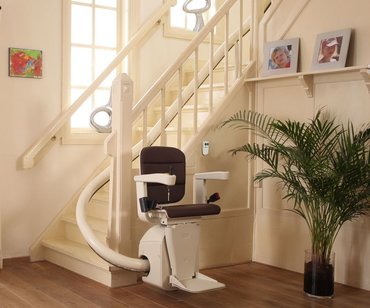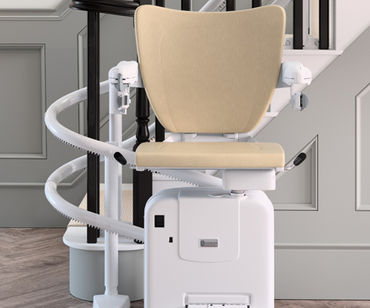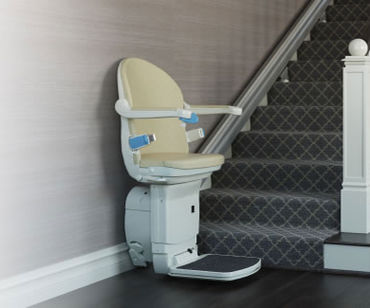How to care for someone with dementia

Learning that a relative has been diagnosed with dementia can be tough, but with the right help and support, the future can be manageable, both for the patient and their family. While initially, dementia can seem like a lot to take on board, in this guide you can learn how to care for someone with dementia via easy-to-introduce dementia care solutions, which will enable you to make life much easier for your relative. Read on for dementia care tips and answers to frequently asked questions about dementia.
Tips about caring for someone with dementia
If someone you know, perhaps a family member, has been diagnosed with this disease, discover some tips for helping someone with dementia.
Adapt the home
In the early stages of dementia, it is usually possible for the patient to continue living in their home independently, with just a few inexpensive adjustments. As the disorder affects memory, items in the home such as clocks displaying the days of the week and pill boxes with time compartments can be really useful.
Dementia can have a big impact on mobility as the condition progresses, affecting balance, reaction times, the ability to walk and stand up, and the person in question may also be more likely to fall. As a result, you may wish to adapt your relative’s home further, taking all the necessary precautions to avoid trips and falls.
Walk-in shower enclosures can take the danger out of bathing, while rise and recline chairs can reduce the risk of falls when moving to sit or stand. When making larger decisions, such as whether a stairlift is needed to continue living independently, we advise being on hand to ensure your relative is weighing up all the options and can ask for your opinion should they need it.
READ ALSO: 8 tips for making your home safer
Make the most of available support
There are multiple services which can be utilised by older people, such as those with dementia. For example, Meals on Wheels or laundry services can help to ease the pressure of everyday tasks that may have become difficult.
You may wish to join the Alzheimer’s Society, where you can reach out to people who understand your situation and ask for further information about the disease.
Getting advice from carers can also give you more of an insight into what to expect, should you wish to continue caring for your relative for the foreseeable future, with carers’ groups available for those who have already committed.
Sort out responsibilities
Up until now, your relative has probably been responsible for their own bills, but this may soon have to change. Remembering to make payments requires organisation, but this can be helped by arranging direct debits so that funds are automatically taken from your relative’s bank account.
Another step you could take to avoid anything being cut off would be to contact all the service providers, in order to inform them that your relative has dementia and give an alternative contact number.
Although this might seem insensitive right now, it is wise to encourage your relative to make a will while they still have the mental capacity to do so. This may also help to put their mind at rest if they are likely to worry about things like this in future.
Dementia communication tips

Communicating effectively is one of the most important tips for caring for dementia patients. Find a few key dementia communication tips below.
Speak with sensitivity
While easier said than done, it is essential that you talk to those with dementia with care and caution, making sure not to upset or confuse them unnecessarily.
Be patient
Repetition or persistence can be frustrating for you, but your relative is most likely unaware of this, meaning a short response may be taken to heart. Allow extra time for the person to communicate, as it may take longer for them to process information and find the right words.
Leave reminders
It is common for those with dementia to find it difficult to remember things, which can be testing, especially when things such as important dates are missed. Instead of giving your relative a telling-off, leave helpful reminders on post-it notes or call before an appointment to give a gentle nudge.
Focus their attention
Try and keep the person's attention focused by speaking slowly and clearly, using short sentences and concrete words.
Communicate physically
Use touch, facial expressions, and gestures to communicate, as these can be more effective than words for people with dementia.
Try to avoid arguments
Avoiding arguments or confrontations with a dementia patient is important, even when frustrated, as arguments can be confusing and distressing for them.
Stay positive
One of the best tips for communicating with a person with dementia is to try to stay positive and avoid correcting the person's mistakes or false memories.
Utilise familiar surroundings
Dementia can be very confusing, so try to use familiar surroundings and objects to help the person feel more at ease and better able to communicate.
Get additional help
You could consider enlisting the help of a speech therapist or occupational therapist, who can provide additional strategies and techniques for improving communication.
Tips for communicating with a person with dementia:
- Speak with sensitivity
- Be patient
- Help them when they struggle to communicate
- Leave reminders
- Focus their attention
- Communicate physically
- Try to avoid arguments
- Stay positive
- Utilise familiar surroundings
- Get additional help
Think about future care

It can sometimes be necessary for someone with dementia to need more care than it is possible to give in their own home.
When this time comes, one of your options is to place your relative in a care home, where they will have support on hand 24/7. Age UK can help you find a suitable residence for your relative, with advice on selecting a care home available.
Advanced dementia can mean the person in question requires moving and lifting by other people, which may become too much for just one person to carry out and could cause injury if not conducted properly.
Qualified nurses and carers will have plenty of experience when it comes to looking after those with dementia, meaning your relative will be placed in safe hands, putting your mind at rest.
Stay calm and patient
Caring for someone with dementia can be challenging and frustrating at times. It's important to try to stay calm and patient, as the person with dementia may not be able to control their behaviour or remember things.
Make the environment safe
As dementia can impact mobility, remove any potential hazards from the person's living space, such as loose rugs or clutter that could cause them to trip and fall.
READ ALSO: Space-saving ideas for smaller homes
Provide structure and routine
A top tip for helping someone with dementia is to create a routine they can follow. People with dementia may benefit from a structured daily routine, as it can help them feel more secure and reduce confusion.
Encourage independence
Try to allow the person with dementia to do as much as they can for themselves, as this can help them maintain a sense of control and dignity - two things which dementia patients can feel like they have lost due to their condition.
Take care of yourself
Helping someone with dementia is wonderful but don’t forget your own health in the process. Caring for someone with dementia can be emotionally and physically draining so make sure to take breaks and get support from family, friends, and professional caregivers.
Helpful dementia tips
- Adapt the home
- Make the most of available support
- Sort out responsibilities
- Communicate effectively
- Plan future care
- Stay calm and patient
- Make the environment safe
- Provide structure and routine
- Encourage independence
- Take care of yourself
Frequently asked questions about dementia and dementia care

Learn the answers to some frequently asked questions about dementia and dementia care, helping you to learn more about the disease and how to care for someone with dementia.
What is dementia?
Dementia is a term used to describe a decline in cognitive function, including memory, language, and problem-solving abilities. It is typically caused by damage to the brain, most commonly from Alzheimer's disease, stroke, or injury. Dementia is a progressive condition, meaning that it tends to worsen over time.
What is the difference between Alzheimer’s and dementia?
Alzheimer's disease is a specific type of dementia that affects memory, thinking, and behaviour. Dementia is a general term used to describe a decline in cognitive function, while Alzheimer's is a specific diagnosis that can be made based on certain characteristics of the disease.
What are the signs of dementia?
Signs of dementia can include memory loss, difficulty with language, disorientation, mood changes, and difficulty with problem-solving or planning. These symptoms may interfere with a person's ability to carry out their daily activities.
What are the stages of dementia?
The stages of dementia can vary depending on the type and severity of the condition. However, some common stages of dementia include:
Mild: The person may have some memory loss and difficulty with language and problem-solving, but they are still able to carry out most of their daily activities independently.
Moderate: The person may have more significant memory loss and difficulty with language and decision-making. They may also experience changes in behaviour and personality and may need some assistance with daily activities.
Severe: The person may have significant memory loss and difficulty communicating and may be unable to carry out daily activities without assistance. They may also need help with basic self-care tasks such as bathing and dressing.
What is dementia care?
Dementia care is the support provided to people with dementia, typically by family members, caregivers, or professional healthcare providers. Dementia care may include help with daily activities, medication management, and providing a safe and supportive environment.
When should someone with dementia go into a care home?
If a person with dementia requires more care and support than you can provide, it may be necessary for them to move into a care home where they can receive 24-hour care. As dementia is a progressive condition, it is important to be aware that the person may need increasing levels of care over time
Do dementia patients pay for care?
In most cases of dementia, the person with dementia will be required to pay towards the cost of their care. Dementia patients may be entitled to benefits, however, including Attendance Allowance and Personal Independent Payment.
Do dementia sufferers have to pay care home fees?
People with dementia will normally have to pay toward the cost of a care home. This will either be self-funded or with the help of a local authority – this is determined by a financial assessment.
However, Carehome.co.uk explains that: “A person with dementia may be eligible for NHS continuing healthcare, which means the NHS organises and fully funds their social care, including services from their local council.”
Discover more about NHS continuing healthcare.
How to get respite care for a dementia patient?
Respite care is when you take a break from caring, with the person you care for being looked after by someone else.
Respite care can range from a volunteer who takes over for a few hours to a funded carer that allows you to have an extended break.
The first step towards funded respite care is getting assessed and then contacting a carer, day-care centre, or care home to find the respite care you desire.
Discover more information about respite care.
What is meant by a person-centred approach to dementia care?
A person-centred approach to dementia care is a type of care that focuses on an individual’s interests, abilities, personality, and history.
The charity, Alzheimer’s Society, explains the benefits of a person-centred approach to dementia care: “Person-centred care helps to ensure people with dementia can take part in the things they enjoy. It can be an effective way of preventing and managing behavioural and psychological symptoms of dementia.”
Can a patient with dementia refuse care?
A person with dementia can refuse to receive care, however, if the disease has progressed to a point where the person lacks the capacity to make such a decision, the choice can be made for them by the person’s attorney.
READ ALSO: The best over 60s discounts in the UK
Hopefully, this guide has shed some light on how to care for someone with dementia. If you or a loved one is in need of mobility equipment like stairlifts to help make your home more accessible, please book a free home assessment.
For more tips, guides, and advice, make sure to visit our news page.



